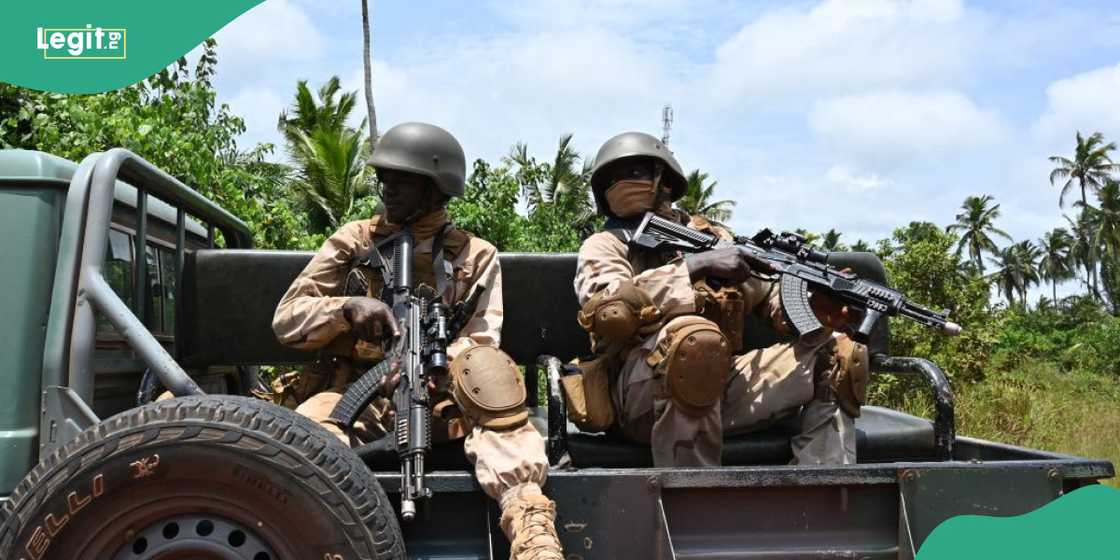- Nigeria’s Defense Headquarters has labeled Lakurawa as a terrorist group linked to Sahel jihadists
- Initially welcomed to combat banditry, Lakurawa quickly turned to enforcing Islamist laws, demanding alms, and intimidating local communities
- Following an August attack that killed three soldiers, the military declared nine Lakurawa leaders wanted
The Nigerian Defense Headquarters recently identified Lakurawa as a terrorist group affiliated with jihadist elements in the Sahel, operating with a dangerous new presence in the northwestern states of Nigeria.
Although initially perceived as seasonal herders, the group's true nature has now been exposed.

Source: Getty Images
Legit.ng has put together breakdown of Lakurawa's evolution, activities, and impact on local communities:
Emergence of Lakurawa
In 2018, locals in Sokoto’s Tangaza and Gudu areas raised concerns over an unusual group of herders operating in nearby forests.
Though heavily armed, they were initially described by police as seasonal herders from Niger Republic, not as violent militants.
The situation changed this week when the Nigerian Defense Headquarters declared Lakurawa a “new terror group.”
The Director of Defense Media Operations, Edward Buba, said:
“The terrorists took advantage of gaps in cooperation between both countries and exploited difficult terrains to spread their ideology in remote areas.”Who are the Lakurawa?
Lakurawa began as a group of herders who, according to locals, arrived from Mali speaking Fulfulde and Arabic and had a history of militant activity, as reported by HumAngle.
The group quickly established camps around Nigeria’s border, notably in Sokoto, to spread radical ideologies under the guise of protecting communities.
As shared by Alhaji Aminu Dikko Tangaza, a resident of Tangaza:
“Lakurawa’s members arrived as herders but rapidly showed their militant leanings. They initially protected us from banditry but soon introduced strange laws and began demanding funds and cattle for weapons.”Lakurawa: From protectors to aggressors
To combat rising banditry, some local leaders invited Lakurawa to aid in security, which involved training local youth.
However, the relationship soon soured as Lakurawa began enforcing strict Islamist laws on the communities they claimed to protect.
Magajin Balle, a local chief, noted the change:
“My advice was not to allow our youth to participate in this, but some leaders insisted. They later faced issues when the group started taking alms [zakat] and imposing new laws on our people.”This shift from ally to oppressor was confirmed by residents, who reported Lakurawa’s demands for cattle as zakat, their refusal to consult local leaders, and their imposition of harsh laws on civilians.
How the armed Lakurawa group operates
As reported by BBC Pidgin, the Lakurawa group spreads its messages by preaching to people, telling them they reject any involvement with the police, soldiers, politicians, or government officials.
They also express strong opposition to Western education.
A source stated that the armed group speaks to people in various languages.
Reports show that when they preach or teach, they translate their messages into Hausa, Fulfulde, Abzinanci, English, and other languages.
The source said about eight months ago, after security forces in Niger Republic drove them out, the group returned to the Sokoto area.
At first, people were pleased with the group’s arrival because they killed the bandits who had been terrorizing the Sokoto area and even seized their weapons.
The source added that the group punishes young people who wear what they deem inappropriate hairstyles.
Military attacks and ongoing threats
Lakurawa’s turn to violence became undeniable on August 10, when they attacked a military base in Sokoto, resulting in the deaths of three soldiers.
Since then, they have focused their attacks on government security forces and rival armed groups, while largely sparing civilians who comply with their radical beliefs.
The Nigerian military has responded by declaring nine key Lakurawa leaders wanted. Among them are Abu Khadijah, Abdurrahman, and Musa Wa’a, all suspected of leading violent incursions across Sokoto.
Lakurawa’s influence in Sokoto’s rural communities
Lakurawa operates through fear, maintaining control by imposing “Darul Islam” camps and indoctrinating communities with their version of Islamic law.
They regularly preach in Hausa and Fulfulde, while recruiting and training young men between the ages of 18 and 35.
As highlighted in a study by Professor Murtala Ahmed Rufai of Usmanu Danfodiyo University, Sokoto:
“Lakurawa operates similarly to other radical groups, separating themselves from society and claiming ideological purity. Their armed presence is a form of intimidation to enforce these beliefs.”Local leaders have also expressed regret at the support given to Lakurawa initially, saying
"We thought they could help fight other armed groups, but they used our resources to build a presence we now can’t control,” said a local leader.NAF strikes kill several terrorists in Niger forest
Earlier, Legit.ng reported that several terrorists were killed in Alawa Forest in Shiroro local government area of Niger state.
The Nigerian Air Force (NAF) bombarded the hideout of the terrorists to secure power infrastructure and restore power in Kaduna and other North Western states.
The NAF’s spokesman, Air Commodore Olusola Akinboyewa, said the terrorists were killed and their logistics with precise firepower.
PAY ATTENTION: Сheck out news that is picked exactly for YOU ➡️ find the “Recommended for you” block on the home page and enjoy!
Source: Legit.ng
















 English (US) ·
English (US) ·